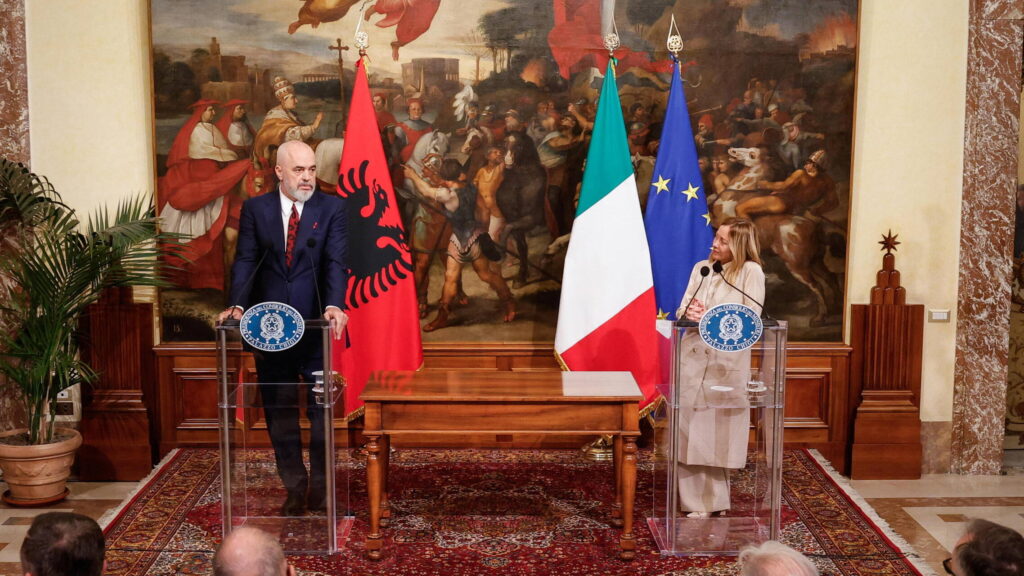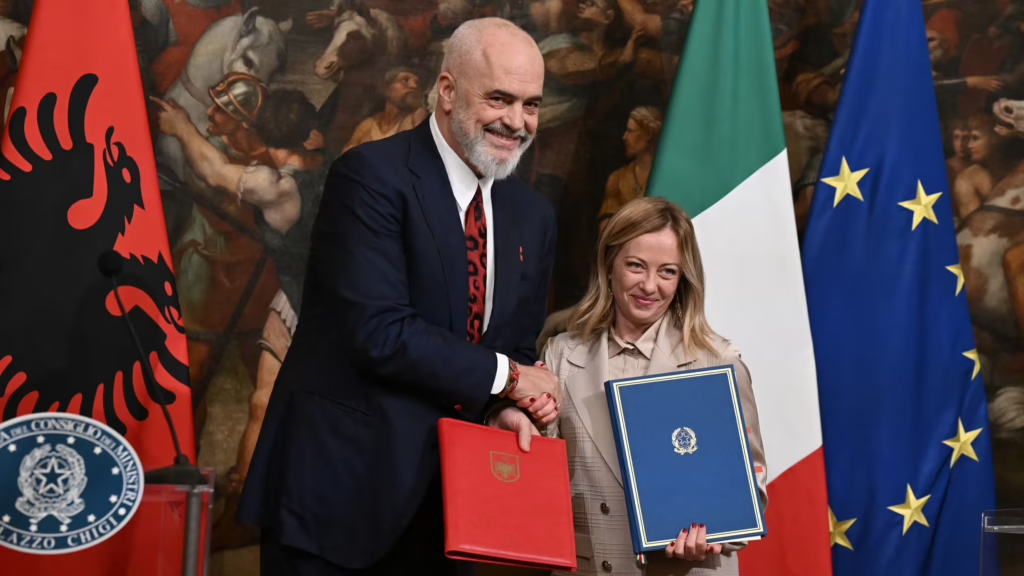« The land of eagles »
Albania, or otherwise known as ‘Shqiperia’ in Albanian, literally meaning ‘the land of eagles’, is a country in south-eastern Europe. Albania is surrounded by Montenegro, Kosovo, Macedonia and Greece. It is bordered by two seas: the Adriatic Sea to the west and the Ionian Sea to the south-west. They both give it direct access to the Mediterranean. The capital is Tirana, a country of around 2.8 million inhabitants who speak Albanian. The population is predominantly Muslim, with some Christian minorities. Albania has a rich history influenced by the Illyrians, Romans, Byzantines and Ottomans. It is a developing country with key sectors in tourism, agriculture, energy and mining. Culturally, Albania is famous for its beaches, mountains, archaeological sites and historic towns such as Berat and Gjirokaster. They are UNESCO World Heritage Sites.
Politically, Albania is dominated by two major parties, the Socialist Party and the Democratic Party. Albania is a parliamentary republic where power is exercised mainly by parliament and the government. The president is Bajram Begaj, elected in July 2022. He is a former head of the Albanian armed forces and is seen as politically independent. As President, his role is largely symbolic, embodying national unity and playing a role in diplomatic relations. The prime minister, Edi Rama, has held the post since 2013. He is the leader of the socialist party, and his ambition is to bring Albania closer to the European Union. Albania has been a candidate for membership of the European Union since 2014.
« The land of la dolce vita »
Italy is one of the leading economies in the European Union. Generally ranking as the third largest economy in the Eurozone (after Germany and France). Politically, Italy is a parlimentary republic. Sergio Mattarella took office on February the 3rd 2015. Giorgia Meloni is Italy’s first female prime minister. She has headed the government since October 2022 and is the leader of the Fratelli d’Italia party. This party has neo-fascist roots and is perceived as a right-wing populist party.
As far as immigration is concerned, it’s a subject that plays an important role in Italy. It has become a central issue on an economic, social and political level. Italy is the country that connects the migrants who are trying to reach Europe by sea. These migrants come from North Africa and the Middle East. In 2023, 157,000 migrants arrived in Italy by sea. This figure is set to rise, since in 2022 there were 105,000 migrants. This increase is justified by the fact that the countries of origin of these migrants are in economic difficulty such as Egypt, Tunisia and Bangladesh. To deal with this, Georgia Meloni has signed agreements with North African countries including Tunisia. Thus, they prevent migrant boats from taking to the sea and to secure the borders and discourage departures. The other solution was to conclude a processing agreement with Albania.
The agreement between Italy and Albania
« We decided to conclude this agreement on immigration because we feel responsible as neighbors and as Europeans ». “It’s certainly better than fighting ideologically on this issue and doing nothing”, said Edi Rama.
Tirana and Rome signed this agreement in November 2023, but what exactly does it involve? Migrants intercepted at sea by the Italian authorities will be transferred to reception centers located near the Albanian port of Shengjin. During this time, their applications for international protection will be processed by Italian staff. Only migrants from countries judged to be ‘safe’ by Italy will be taken there; other applications are likely to be rejected. The list currently includes 22 countries (Albania, Algeria, Bangladesh, Bosnia-Herzegovina, Cameroon, Cape Verde, Colombia, Gambia, Georgia, Ghana, Egypt, Ivory Coast, Kosovo, Nigeria, Northern Macedonia, Montenegro, Morocco, Peru, Senegal, Serbia, Sri Lanka and Tunisia). Those whose files meet the criteria for accelerated asylum procedures will be transferred to detention centers in Albania. The Italian government will not send vulnerable people such as pregnant women, children or others, however there are no guarantees or safeguards to identify these groups and ensure that they are exempt from detention and deportation.
Italy’s aim is to process up to 36,000 applications a year in Albania. But what will Albania gain? Edi Rama denies that this is a service in return for Italy’s efforts to get the country on the road to membership of the European Union. ‘Albania’s unconditional love for Italy means that Rome has the exclusive privilege of hosting asylum seekers on Albanian soil’, he says. However, there are still some benefits.
First of all, there are diplomatic and political advantages for Albania. In fact, according to Edi Rama, this agreement will strengthen relations with Italy, which has ‘an unconditional love’ for the country. The agreement would also be an opportunity to boost Italy’s support for Albania’s bid to join the European Union. Albania officially applied to join the EU in 2009. In 2014, it was granted official candidate status. To join the EU, Albania must meet several EU conditions, known as the Copenhagen Criteria. These include institutional stability, the rule of law, the fight against corruption, judicial reform and freedom of the press.
Then there are the economic benefits. The Italian government had initially earmarked a budget of €650 million. This for five years to finance the construction and running of the reception centres. Total expenditure could exceed €1 billion. In addition, running these centres will require the recruitment of local staff, thus creating employment opportunities for Albanians. Finally, from an international perspective. The agreement positions Albania as a key player in the search for solutions to Europe’s migratory challenges. Indeed, the agreement is considered to be ‘innovative’ and is attracting the attention of other European countries. In a joint letter sent to the European Commission in May 2024, 15 Member States urged the EU to draw inspiration from models such as the Italy-Albania protocol as part of a joint initiative to partially externalise the EU’s immigration and asylum policy.

The criticisms of this agreement
Indeed, as far as human rights fears are concerned, the right to seek asylum is enshrined in European and international law. People have a fundamental right to seek asylum. This, regardless of their country of origin or the place where they lodge their application. The Internal Rescue Committee has warned that the Italy-Albania agreement poses major risks for people on the move. According to Flaminia Delle Cese, legal and advocacy advisor to IRC Italy, ‘Italian centers for asylum seekers in Albania should not exist’. She added that ‘Moving people to closed centers outside EU territory jeopardizes the fundamental right to seek asylum, by effectively detaining people who are trying to find safe haven and protection’.
There are also fears of a lack of surveillance, and a risk of illegal discharge. Indeed migrants might be taken to Albania without prior identification.
To conclude, this agreement is still being implemented. We’ll have to keep an eye on it over the coming weeks, perhaps inspiring other countries to follow.










